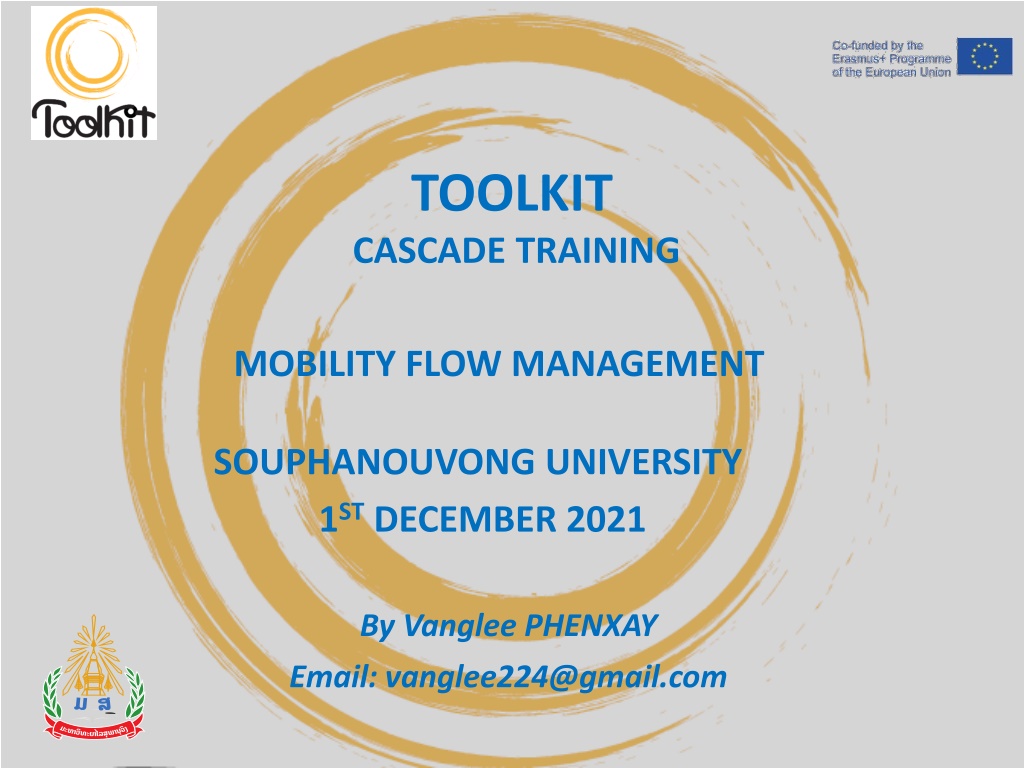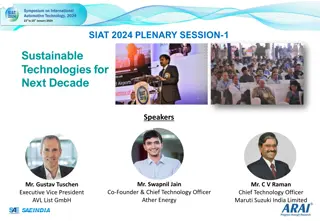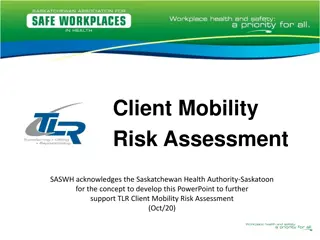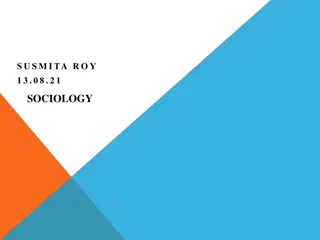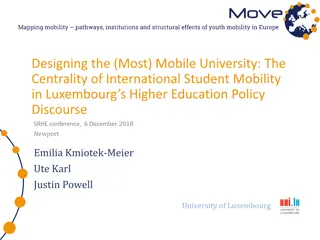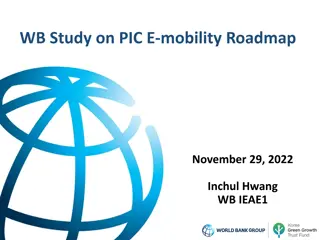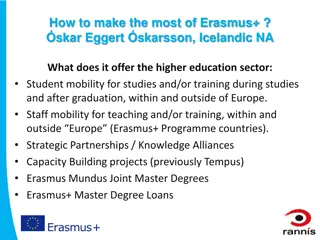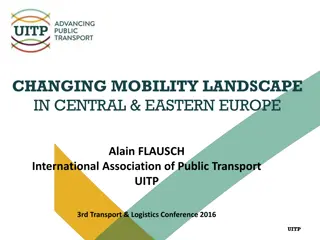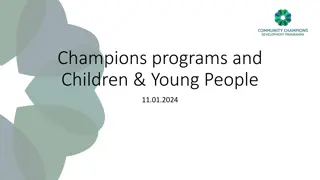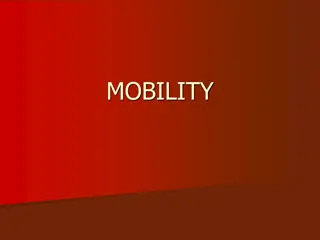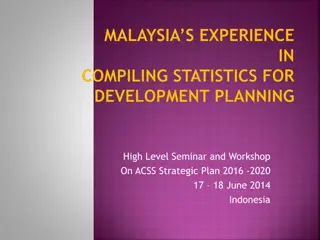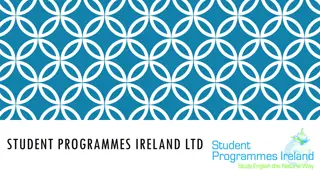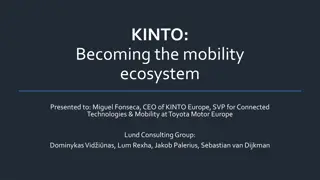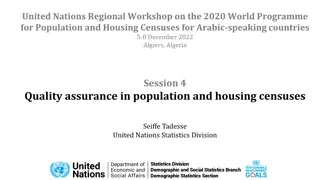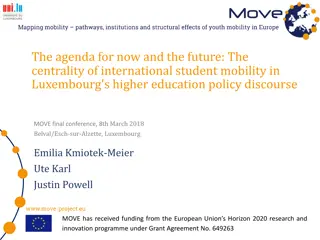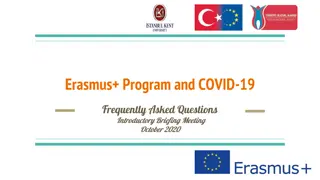Strategies for International Mobility Programmes at Souphanouvong University
Souphanouvong University is implementing strategies for international mobility programmes, aiming to enhance global perspectives for students and staff. The university collaborates with various international partners and focuses on outbound and inbound mobility, infrastructure development, database management systems, and risk management strategies.
- Mobility Programmes
- Internationalization
- University Partnerships
- Souphanouvong University
- Global Perspectives
Download Presentation

Please find below an Image/Link to download the presentation.
The content on the website is provided AS IS for your information and personal use only. It may not be sold, licensed, or shared on other websites without obtaining consent from the author. Download presentation by click this link. If you encounter any issues during the download, it is possible that the publisher has removed the file from their server.
E N D
Presentation Transcript
TOOLKIT CASCADE TRAINING MOBILITY FLOW MANAGEMENT SOUPHANOUVONG UNIVERSITY 1ST DECEMBER 2021 By Vanglee PHENXAY Email: vanglee224@gmail.com
International Relations Office Handbook The Partners Universities: European Universities: 1. University of Bologna 2. Uppsala University 3. Vilnius University Sri Lanka Universities: 1. University of Peradeniya 2. University of Kelaniya Myanmar Universities: 1. University of Yangon 2. Yangon University of Economics 3. Yezin Agricultural University Lao Universities: 1. National University of Laos 2. Souphanouvong University
IRO Handbook I. Strategies and Management of Mobility Programmes II. Outbound Mobility. III. Inbound Mobility
Strategies These strategies consist of 10 main tasks. Strategies for Students and Staff Mobility Programmes The structure of the IRO Enhancing Internationalization University Policies on Internationalization The Role of IRO Credits Trasfer Policy. Competency of IRO University Strategic Plan for IM Quality Insurance System KPIs for IRO
2. Infrastructure Development Strategy Targeting Mobility Programmes Infrastructure Development Alumni Forum Handbooks for Inbound and Outbound Staff and Students; International Student Association Practical Information Brochure Cultural Do s and Don ts
3. Management 1. Database Management System 2. Guidelines for Inbound and Outbound Mobility Programmes 3. Inbound Mobility Programmes 4. Outbound Mobility Programs 5. Counselling Service for Mobility Programmes 6. Selection Criteria for the University/Programme 7. Progress Monitoring Mechanism for Mobility Programmes 8. Risk Management Strategy 9. Visa
II. Outbound Mobility Opportunities for students and satff: to experience academic programmes offered at another university, to achieve and expand the educational experience for students/staff, to enhance their understanding of global issues and perspectives related to their fields of study.
Outbound Mobility (cont) Sending University (SU): in charge of selecting students/staff and sending them abroad. supporting applications, monitoring and recognition related to the mobility period. Receiving University (RU): in charge of receiving students/staff from abroad. offering them a study program, training activities, or a teaching activity, etc. preparation,
Outbound Mobility (cont) 1. Setting Criteria 1) Type of programme: (Semester exchange/ short-term exchange). 2) Aim of the study: (Study programme /internships / study tour / contest / seminar / workshop/ conference) 3) Field of the study. 4) Starting time and duration of study. 5) Funding: (fully-funded or requiring a student contribution 6) Designated universities and available seats.
Outbound Mobility (cont) Requirements imposed by receiving university. 1. grades; 2. language ability; 3. unit of study pre-requisites; 4. course progression; 5. field of study; 6. Auditions (if any) 7. health insurance (if any) 8. Security clearance (if any) 9. Passport (if applicable)
Outbound Mobility (cont) 2. Application Procedure. Academic Purpose Statement (Motivation Letter) Proposed study plan Academic records: Transcript (GPA) Language test Approval of the Course Coordinator of the sending university. Recommendation applicable letters Financial support (scholarship/loan/grant) Health certificate Certificate of Registration (Proof of enrolment) Passport (if applicable)
Outbound Mobility (cont) 3. Selection Process 3.1 Academic Purpose Statement (Motivation Letter) a. The purpose of joining the scholarship program. b. What can you contribute to this program and what will your home country get from your experience? c. Why are you interested in attending your receiving university? d. Any certificate or skills that can strengthen your application.
Outbound Mobility (cont) 3.2 Decision Process Student s verified educational record, GPA, and interview results. Availability of funds, number of applicants and range of GPA. All applicants considered will be notified of the final decision by the receiving university. Non-discriminatory on any grounds (gender, ethnicity, religion etc.)
Outbound Mobility (cont) 4. Arrangement for Exchange Program Information session Visa Air Ticket Travel and Health Inureance Tuition fees and Living Expenses Accommodation Arrangement .
Outbound Mobility (cont) 4.1 Information session Applicants should understand and follow the guidelines of the scholarship and the exchange program. Applicants must agree to enrol at the receiving university program plan and agree to abide by the rules and regulations of the receiving institution.
Outbound Mobility (cont) 4.2 Visa These documents are needed for Visa Application: Visa application form; Photo (Passport size); A valid Passport (at least six months validity) Proof of economic independence for your stay in the host university; Proof of accommodation from host university. Request letter from the host university; Health Insurance & Travel Insurance (if applicable). Remark: It is the responsibility of applicant to process the visa by contacting his/her host university or relevant embassy in home country.
Outbound Mobility (cont) 5. Recognition of Studies (Credit Transfer) The credits earned for successfully completing courses at the receiving university can be accepted at the sending university, Students are not required to repeat these courses upon their return to the sending university, The relevant authority of sending university will evaluate all the documents and decide the credits completed could be transferred to the sending university.
Outbound Mobility (cont) 6. Reporting, Recording, & Publicizing 1 Reporting. (case by case, depending on the subject). 2. Recording and evaluation. (The IRO of RU & SU should have a filing system in order to record and evaluate the whole process such as advertising, nomination, applications, courses, results, and outcomes). 3. Publicizing (outcomes of exchange programmes could be done in the IRO website and university webpage).
III. Inbound Mobility 1. Definition of Inbound Mobility The host university receives students from another university domestically or abroad for a specific period of time, Inbound Mobility provides opportunity for the students to engage in academic at the host university.
Inbound Mobility (cont) 2. Basic requirement for inbound mobility 2.1Available Courses for International Students. Available courses for international students. Courses are taught in English Courses (degree program, number of credits, course content, evaluation criteria etc.)
Inbound Mobility 3. Application Process 1). Compiling Application Documnent 3). Selection Process 2). General selection Criteria 4). Informing the selection results
Inbound Mobility 1). Compiling Application Document 1. CV 2. Application form 3. Transcripts 4. Recommendation Letter 5. Motivation letter 6. Study plan 7. Passport bio page 8. Nomination letter from the university
Inbound Mobility 2). General Selection Criteria. 1. Completed at the minimum satisfactory study according to the university prior. 2. Good academic standing, as reflected by previous academic study, ( GPA of 3.0). 3. Good knowledge of English communication. 4. Provide evidence of proficiency in English (e.g. TOEFL or IELTS). 5. Areas of study, academic calendar, and the application deadline.
Inbound Mobility 3). Selection Process All application forms submitted will be received and reviewed by the IRO. IRO of RU will submit the applications to the relevant faculty qualifications. to as certain entry
Inbound Mobility 4. Before the students arrive 1) Invitation / admission letter from the host university 2) Passport, travel documents and tickets 3) Visa (if necessary) 4) Medical certificate. 5) Proof of accommodation (if applicable) 6) Other documents for immigration purposes. 7) Address, telephone number and travel instructions for the participant s final destination 8) Cash to pay for airport transfer and public transport.
Inbound Mobility 5. After arrival of the students (There are 7 tasks) Registration at the Receiving University Welcoming of New Students Accommodation: Living on or off Campus Orientation Session Buddy Program Participanting in Cultural Programs Language Classes
Inbound Mobility 6. After Completion of the Course Feedback and Report Students submit interim progress and final and feedback on learning experience to the IRO of SU. Assessment, transcripts, and certificates RU is required to evaluate their achievement based on the offered courses. The transcripts and certificates should be issued by RU
IV. Inbound Staff Mobility The IRO of RU is the main source of contact for every visiting staff member(s). The IRO provides the rules and regulations of the receiving university and country. All information about accommodation, banking and finance system, facility, library, assessment, leisure and etc are also provided.
Before Arrival of the Researcher/Staff IRO of RU guides and checks. Govermant Approval Field of Interest Visa Passport Copy Health Insurance Research Proposal and Letter of Intent Period of Stay CV
Before Arrival of the Researcher/Staff Govermant Approval. The researcher or staff needs to provide the these documents to the HU at least 2 months before arrival: a. Formal acceptance / invitation letter from the host university. b. Work plan (If necessary). c. Dispatch letter from the home university. d. Financial proof (scholarship). e. Copy of passport. f. Passport (valid for at least six months) g. Relevant fees.
After Arrival of the Researcher / Staff These main tasks are related to IRO of Receiving University. Orientation Alumni Network Buddy Program Travel and Transport Feedback and Final Report
Souphanouvong University Thank You for Your Attention Any Questions? SOUPHANOUVONG UNIVERSITY
